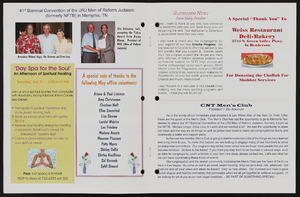Search the Special Collections and Archives Portal
Search Results

Transcript of interview with Walter Weiss by Claytee White, November 2, 2010
Date
Archival Collection
Description
In this interview, Walter Weiss discusses how Judaism and boxing kept him out of trouble in his youth. Weiss grew up in the Boston area, and started boxing as a teenager. Weiss talks about his boxing training, becoming a runner for a bookmaker, and coming to Las Vegas in the 1950s to be a bookmaker for the Stardust Hotel, and working the slot machine floor. He had several different jobs in various casinos, and discusses different people involved in the gaming industry in Las Vegas.
Walter Weiss life story begins in a Malden, Massachusetts during the Great Depression. His early background was a blend of observant Judaism, secularism, and the effects of the era. He was a troubled youth whose older brother encouraged him to join him in boxing. As Walter explains: I was a wild kid and ... boxing saved my life. His aptitude for boxing led him to be a sparring partner in New York City's famous Spillman Gym. There he met and worked out with some of the greatest fighters of the era, including Rocky Marciano. He recalls how he turned professional while attending the University of Miami and how he first came to Las Vegas in 1958 to escape his personal troubles and find work with a local bookmaker. Thus began his diverse employment history in the casino industry. He details his various positions and the cast of famous and infamous characters of the times. For six years he return to New York and worked as a Wall Street broker before arriving back in Las Vegas in 1973. He talks about his property ownership, lobbying for an amendment to Senate Bill 208, his personal religious changes and a sundry of observations about the changes that occurred as the state took over gaming.
Text

Transcript of interview with Greg Goussak by Barbara Tabach, May 19, 2015
Date
Archival Collection
Description
Interview with Greg Goussak by Barbara Tabach on May 19, 2015. In this interview Goussak discusses his upbringing in Las Vegas, including his education in the Clark County School District and his experience with bussing to Sixth Grade Centers as the school district attempted to desegregate. As a teenager, he became involved with the B'nai B'rith Youth Organization through Temple Beth Sholom. Goussak talks about his mother's involvement with the Albert Einstein Hebrew Day School, which later moved and became the Dr. Miriam and Sheldon Adelson Educational Campus, and the kidnapping of Cary Sayegh. He then discusses finding his niche in accounting through taking an accounting course at UNLV as a high school student. Goussak talks about his education, career path as a controller in the gaming industry and public works projects, and becoming a professor.
Greg Goussak is a Las Vegas native, born January 1961, just after his parents moved to the city for his father's work as an accountant. His mother was a dedicated educator, who served throughout the city as a teacher and principal, including as the director of the Hebrew Day School in the 1970s. Greg's childhood was shaped by experiences with Las Vegas' sixth grade centers, challenges with scoliosis, and especially, involvement with B'nai B'rith Youth Organization (BBYO). In 1974, Greg helped start the city's new Aleph Zadik Aleph (AZA) chapter for BBYO, and his involvement with this youth organization became a formative part of his junior high and high school years. During this time, he became very involved with AZA at the regional, district and national levels, and made lifelong friends. As a high school student, Greg participated in UNLV's Early Studies Program, earning him college credit, and there he discovered his aptitude for accounting. He began tutoring fellow high school students in accounting, and thus, simultaneously discovered his passion for teaching. After earning his bachelor's degree in hospitality administration from UNLV in 1984, Greg got a job at Dunes Hotel and Casino, then under the leadership of Moe Shenker, working as an operations analyst. Over the next decade, Greg worked as a controller at several properties around town, including Nevada Palace, the Four Queens, Fitzgeralds, as well as a project on Boulder Highway. In 1992, seeking a reprieve from the gaming industry, Greg went back to UNLV to achieve his master's degree, in hotel administration. After graduating, he worked for Riviera Hotel and Casino, and established and oversaw their auditing department as well as box office. During this time, Greg met his wife Cynthia (Cindy) Riceberg, and the two were married in 1996. That same year, Greg took a position with Sigma Game, and soon after became Chief Financial Officer for Manpower Temporary Staffing. In 2002, deciding it was time to work for himself, he bought Haynes and Thomas Printers, which he owned and operated for the next eight years. Greg started teaching in 1989 as an adjunct professor in the William F. Harrah College of Hotel Administration at UNLV. In 2010, having finished his doctorate the year before, Greg assumed his first fulltime faculty position as an assistant professor at the University of Southern Nevada. The next year he was hired as an assistant professor at Ashford University, where he continues to teach today in the Forbes School of Business. Greg and Cindy have two daughters: Ariel, who is seventeen years old, and Alyssa, who is fourteen years old.
Text

Transcript of interview with Robert Brown by Ian McLaughlin, February 23, 1981
Date
Archival Collection
Description
Text

Transcript of interview with Louis Fisher by Samuel Barto, March 20, 1978
Date
Archival Collection
Description
On March 20, 1978, collector Samuel Barto interviewed paint and drywall contractor, Louis Fisher (born July 10, 1922, in Alva, Oklahoma) in North Las Vegas, Nevada. The interview took place at the collector’s home with the collector, Mr. Barto and Mr. and Mrs. Fisher present. Mr. Fisher relocated to Las Vegas in 1953 after having lived in Alva, Oklahoma, Portland, Oregon, and Walla Walla, Washington. During the interview, Mr. Fisher discusses the history of Las Vegas from 1953 and offers key insight into the rapid growth of Las Vegas with special focus on the Strip, banks, the steady influx of people moving to Las Vegas for the warm climate, and housing.
Text

Transcript of interview with Breck Wall by Claytee White, July 3, 2003
Date
Archival Collection
Description
Breck Wall grew up tough and honed that toughness into solid business acumen. He also grew up talented and that talent took him to movie sets in Los Angeles and allowed him to produce shows in Dallas, New York, Tahoe, and Las Vegas. Though his family became nonexistent early in his life, he formed his own broad family from a group of faithful friends around the country. One special friendship makes this interview worth reading — the one with Jack Ruby. Wall's talent though is the primary reason that this interview is good history. He did many shows and had up to five running simultaneously. The creative process was the fun part that allowed him to produce Passion , Alias, and Night Beat among many others. Bottoms Up is his signature production and has been at several venues in Las Vegas for the past 40 years. Breck Wall is living a full and interesting life. A good example is a phone call from The London Times'. "Mr. Wall?" 1 said, "Yes." He said, "Are you aware that your best friend, Jack Ruby, just shot Oswald?" I said, "What" I was in shock. I said, "No I'm not." And I talked to him very briefly,and I hung up the phone." The phone continued to ring as calls came in from the Dallas Morning News, The Washington Post, The New York Times, etc, etc.
Text

Transcript of interview with Steven Liguori by Claytee White, January 20, 2010
Date
Archival Collection
Description
Steven Ligouri is an artist who is a born and raised Nevadan whose artistic creations can be enjoyed at such places as the Hoover Dam, where his famous High Scaler sits comfortably [above left photo]. The stories of this statue and others are included within this interview. Steve began mastering his trade as a youngster making jewelry with assistance of his father, Bruno Ligouri who owned a turquoise shop in Boulder City. Since his birth in 1962, Steve has lived in several locations: a family farm in North Las Vegas, John S. Park neighborhood, in Boulder City, and eventually back to John S. Park. Returning to the John S. Park neighborhood after a 22-year absence gives him the chance to reflect on the changes that have occurred. Steve fondly calls the neighborhood "home" and firmly believes it can reach its potential.
Text

Olivia Meneses oral history interview: transcript
Date
Archival Collection
Description
Oral history interview with Olivia Meneses conducted by Elsa Lopez and Barbara Tabach on September 18, 2019 for the Latinx Voices of Southern Nevada Oral History Project. Olivia Meneses describes growing up in Mexico City and attending la Universidad Iberoamericana during the 1968 student movement that culminated in the Tlatelolco massacre. She discusses migrating to the United States in 1983 and moving to Las Vegas in 1985, where she began teaching Spanish to kindergarten students.
Text

Transcript of interview with Shecky Greene by Barbara Tabach, June 5, 2018
Date
Archival Collection
Description
At the time of this interview, Shecky Greene (1926 - ) is energetically snuggled into his modest Henderson home. His wit and signature sense of humor are at in full swing. Shecky sees a joke in every nook and cranny of a conversation and seamlessly spins the moment with a tune or voice characterization. A native of Chicago, his given name is Fred Sheldon Greenfield. His Jewish parents, Bessie and Carl Greenfield raised Shecky and his older two brothers in a secular but kosher setting. He recalls honing his humor as a child and creating his path to a decades-long career in comedy lounges and in film. His narrative glitters with names of Las Vegas entertainment history. He also talks about his passion for the St. Judes Ranch in Boulder City.
Text

Erica Mosca oral history interview: transcript
Date
Archival Collection
Description
Oral history interview with Erica Mosca conducted by Cecilia Winchell, Stefani Evans, and Jerwin Tiu on February 3, 2023 for the Reflections: the Las Vegas Asian American and Pacific Islander Oral History Project. In this interview, Mosca reflects on her life journey from a low-income Asian American to a current serving Nevada State Assemblywoman. She recalls that most of her childhood was in Palm Springs, California where she enjoyed a diverse community of students within her education system. It was not until she moved to Navato, California where she first experienced the economic and resource gap between economically diverse areas. Mosca went on to be involved in a college readiness program and received a scholarship to Boston University. After college, Mosca went on to work for Teach for America where she was stationed on the east side of Las Vegas at Goldfarb Elementary School where she grew a passion for leadership. She eventually returned to school and graduated from Harvard University, returning to Las Vegas to start her nonprofit "Leaders in Training." Mosca hopes to inspire change in her communities by enacting legislation and initiatives targeted towards the communities she was and continutes to be a part of.
Text

